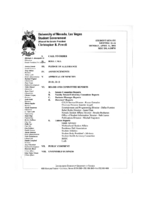Search the Special Collections and Archives Portal
Search Results

Meeting minutes for Consolidated Student Senate, University of Nevada, Las Vegas, April 14, 2003
Date
Archival Collection
Description
Text

Catherine Cortez Masto oral history interview: transcript
Date
Archival Collection
Description
Oral history interview with Catherine Cortez Masto conducted by Claytee D. White on August 10, 2018 for the Latinx Voices of Southern Nevada Oral History Project. Catherine Cortez Masto grew up in Las Vegas near where the town ended and the desert began, which at that time was near Decatur and Pennwood. She grew up playing in the streets and riding horses and motor bikes with girlfriends and cousins. Her father, Manny Cortez, began as a valet at the Dunes before entering politics. He served 16 years on the County Commission and then 13 years as the chief of the Las Vegas Convention and Visitors Authority. As the head of the LVCVA, Manny oversaw campaigns to increase tourism, enlarge McCarran International Airport, improve taxicab service, and served as a visionary for the entire region. Catherine followed in her father's footsteps while being her own woman and making her own mark on the region. She attended college at UNR and law school at Gonzaga University School of Law. After a clerkship, she worked for a small local Las Vegas firm for 4 - 5 years, then moved to the governor's and then served two terms as Nevada's Attorney General. Currently she's in the US Senate with committee assignments that include Banking, Housing and Urban Affairs; Energy and Natural Resources; Commerce, Science, and Transportation; Rules and Administration; Indian Affairs, and the Committee on Aging. Subjects discussed include: Dunes, Manny Cortez, County Commission, LVCVA, Judge Carl Christensen, Judge Mendoza, Taxi Authority, Tourism, and Mike O'Callaghan.
Text
Audio clip from interview with Samuel Smith, June 17, 2011
Date
Archival Collection
Description
Part of an interview with Samuel Smith, June 22, 2011. In this clip, Smith speaks about his run-in with Las Vegas police when he moved to the area, and the relationship between police officers and the black community.
Sound
Audio recording clip of interview with Woodrow Wilson by Gwendolyn Goodloe, February 28, 1975
Date
Archival Collection
Description
Part of an interview with Woodrow Wilson conducted by Gwendolyn Goodloe on February 28, 1975. Wilson recalls his experiences in the NAACP and the Nevada Legislature, particularly his support for equal rights in business and housing.
Sound
David Rea Collection of Howard Hughes Publicity Photographs
Identifier
Abstract
This collection is comprised of publicity photographs of Howard Hughes and his aircrafts, from approximately the 1940s to the 1950s, that were compiled by David Rea, former pilot for Hughes Aircraft Company. This collection also includes clippings and technical drawings of Hughes aircrafts.
Archival Collection
Eileen Brookman Photographs
Identifier
Abstract
The Eileen Brookman Photographs depict Nevada Assemblywoman Eileen Brookman from 1959 to 1989. The photographs primarily depict Brookman with other Nevada politicians, including U.S. Senators Harry Reid, Alan Bible, Eugene McCarty, and Howard Cannon, and Nevada Governors Paul Laxalt, Mike O’Callaghan, Richard Bryan, and Grant Sawyer. The photographs also depict Brookman at political events with the Nevada National Guard, bill-signing ceremonies, and at events in Las Vegas, Nevada.
Archival Collection
Mollie Gregory Collection of Oral Histories
Identifier
Abstract
The Mollie Gregory Collection of Oral Histories contains audio interviews and brief transcripts that focus on welfare, family, and women's issues in Nevada from 1970 to 1974. Gregory interviewed Nevada residents including Maya Miller, Ruby Duncan, and Mary Wesley, who described their lives during the anti-poverty and women's rights campaigns in the early 1970s. The collection documents views on welfare; the Equal Rights Amendment; race, discrimination, and civil rights; and political campaigns.
Archival Collection
Renee Diamond Papers
Identifier
Abstract
The Renee Diamond Papers date from 1972 to 2000 and consist primarily of political and professional materials including reports, correspondence, publications, newsletters, and planning documents collected by Diamond throughout her career. Diamond supported the feminist movement as a member of the National Organization for Women and held leadership roles in the Democratic party in Las Vegas, Nevada. The collection also documents Diamond’s campaigns for the Nevada State Assembly and includes material from her one term in the legislature.
Archival Collection
Jim Rogers Papers
Identifier
Abstract
The Jim Rogers Papers (1977-2014) are primarily comprised of episodes of local Las Vegas, Nevada television program,
Archival Collection
Janice Allen Papers
Identifier
Abstract
The Janice Allen Papers (1927-2011) are comprised of photographs, various publications, awards, a scrapbook, correspondence, memoranda, and newspaper clippings dating from 1953 to 2011 that document Janice Allen's philanthropic and political work in the state of Nevada. The materials document Allen's involvement with the Las Vegas Junior League, the Beta Sigma Phi sorority, and other volunteer work. The collection also contains correspondence received by Allen from various United States politicians. Also included are items from Allen's childhood dating to 1927 and 1928.
Archival Collection
